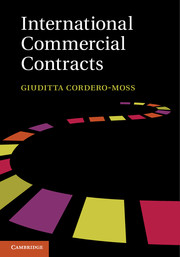Book contents
- Frontmatter
- Contents
- Preface
- Introduction
- 1 Contract practice and its expectations in terms of the governing law
- 2 The role of transnational law
- 3 The impact of the governing law
- 4 Which state law governs an international contract?
- 5 Does arbitration ensure a self-sufficient contract?
- 6 Conclusion
- Bibliography
- Index
3 - The impact of the governing law
Published online by Cambridge University Press: 05 June 2014
- Frontmatter
- Contents
- Preface
- Introduction
- 1 Contract practice and its expectations in terms of the governing law
- 2 The role of transnational law
- 3 The impact of the governing law
- 4 Which state law governs an international contract?
- 5 Does arbitration ensure a self-sufficient contract?
- 6 Conclusion
- Bibliography
- Index
Summary
As we have seen in Chapter 1, international contracts are often written without regard to the governing law – on the assumption that the terms of the contract are sufficiently clear to exclude the necessity of having to consult the governing law, and with the awareness that there is a risk that some of the clauses may not be enforceable under the governing law. This chapter will analyse the consequences of this attitude, in other words: what happens if a contract is drafted without taking into consideration the governing law?
The governing law may have a significant impact on the interpretation of a contract. In addition, the governing law may have mandatory rules or default rules that regulate the object of the contract. These rules may supplement or replace the contractual provisions.
Assuming that the parties have regulated their transaction in the contract with the intention that the contract should be the only and exhaustive regulation of their relationship, we can envisage the following scenarios: (i) the contract regulates aspects that are already regulated by the governing law, (ii) the contract regulates aspects that are not regulated by the governing law, (iii) the contract does not regulate aspects that are regulated by the governing law, and (iv) neither the contract nor the governing law regulate certain aspects. Each of the scenarios in which the contract overlaps, conflicts with or supplements the governing law, can in turn be divided into two according to whether the relevant rules of the governing law are mandatory or not; that is, if the governing law specifies that those particular rules cannot be derogated from by contract or if the governing law permits the contract to regulate the subject matter in a way that is different from the regulation provided for by law.
- Type
- Chapter
- Information
- International Commercial ContractsApplicable Sources and Enforceability, pp. 80 - 133Publisher: Cambridge University PressPrint publication year: 2014



